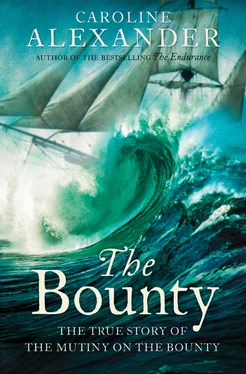A few days after mooring, Bligh set out for Cape Town proper to pay his respects to the governor. The twenty-five-mile journey was made by carriage along a partly treated, mostly sandy road that led across a central tableland skirted by mountains. Bligh was greeted warmly by Governor van der Graaff, who most gratifyingly expressed his wonderment that ‘any ship would have ventured to persist in a passage’ around Cape Horn.
Bligh’s record of his visit to Cape Town speaks only of his own impressions and it is not clear whether he made this short trip alone; but it is very possible that Acting Lieutenant Fletcher Christian accompanied him, for it was here at the Cape that Bligh advanced Christian money. Bligh’s attitude towards his personal finances was, and would be throughout most of his life, one of incessant anxiety and concern. Although securely a ‘gentleman’, William Bligh had from an early age been forced to make his own way in the world and, like many an officer on half pay, he had become accustomed to count and turn every penny. The road ahead offered no immediate source of improvement, and Bligh, as fastidious in his personal economy as in the running of his ship, was reconciled to a life of calculation, self-discipline and sacrifice; to the slow accumulation of security and comfort that would come only through a steady career. Unlike the Christians and Heywoods, whose anciently established sense of entitlement allowed them unblushingly to pile up debts amounting to thousands of pounds beyond any possibility of repayment, Bligh expected to balance his books. Worries about money had beset him as he departed Spithead, since, as he had noted to everyone, taking the commission had resulted in a calamitous drop in pay. Bligh’s loan to Christian, then, amounted to a significant act of friendship – one wonders whether Christian fully appreciated the compromise and anxiety this must have entailed. For his part, although freely given, this was not a gift that Bligh allowed himself or Christian to forget.
Some three weeks after the Bounty came to anchor, the Dublin , an East Indiaman, arrived in False Bay carrying part of the Seventy-seventh Regiment, under Colonel Balfour, saluting Bounty with eleven guns, she was returned with nine. A few days later, Bligh, Colonel Gordon, botanist Masson and a Mr Van Carman were invited on board for dinner.
‘We had a very merry Day of it and a great deal of dancing with the Ladies in the Evening to fine Moon light,’ one officer who was present recorded in his diary; it is gratifying to imagine Lieutenant Bligh indulging in a little social levity. Colonel Gordon entertained the company with stories of his remarkable travels into the interior and, to the astonishment of his fellow diners, even managed a Gaelic song.
In these agreeable circumstances, amidst the sympathetic company of fellow seamen from around the world who well knew the dangers of the southern ocean, Bligh reflected on what he had accomplished. ‘A Dutch Ship came in to day having buried 30 Men & many are sent to the Hospital,’ he wrote to Campbell, ‘altho they have only been out since the last of January.’ He, Bligh, had been out since the end of December. This is a credit I hope will be given to me,’ Bligh continued, confessional as always to Campbell. ‘Indeed had I not been very conversant in these matters I believe poor Fellows they would scarce ever have got here’; Bligh was referring to his own men, for whose lives he took full credit.
‘Upon the whole no People could live better,’ he exclaimed to Campbell, embarking on a description of his nutritious hot breakfasts and portable soups. ‘I assure you I have not acted the Purser with them,’ he let Campbell know, ‘for profits was trifling to me while I had so much at Stake.’
It was not only in his private correspondence that Bligh enlarged upon this flattering theme of his own successful man-management. His official log offered a short dissertation on the subject: ‘Perhaps a Voyage of five Months which I have now performed without touching at any one place but at Tenarif, has never been accomplished with so few accidents, and such health among Seamen in a like continuance of bad Weather,’ he began, not mincing words. ‘And as such a fortunate event may be supposed to have been derived from some peculiar Mode of Management it is proper I should point out what I think has been the cause of it.’
The mode of management was, needless to say, hot breakfasts, clean dry clothes, clean hammocks and a clean ship (‘in cleaning Ship all dark holes and Corners the common receptacles of all filth were the first places attended to’), dancing, infusions of malt, portable soup and sauerkraut. Once again, it is evident that in Bligh’s eyes, his small ship and forty-six-member company were embarked upon a historic enterprise.
‘Seamen will seldom attend to themselves in any particular and simply to give directions…is of little avail,’ Bligh added, echoing the sentiments of many a captain. ‘They must be watched like Children.’
Bligh was not the only man to take advantage of the layover to send reports to England. Thomas Ledward, the assistant surgeon who had joined the Bounty at the eleventh hour, wrote to his uncle describing ‘a continual series of the most violent and distressing weather that ever was experienced.’ The ship was in danger of becoming unfit from her exertions, he reported, continuing that he had no doubt the captain ‘will gain much credit by his resolution & perseverance & by the extreme care he took of the Ship’s company.’
Ledward had been in the habit of keeping a diary, but had just learned that all such private documents would have to be turned over to the Admiralty at journey’s end. While Ledward might not have known it, this had become standard practice since Cook’s first voyage, the purpose being to ensure that any officially sanctioned publication was not undercut by a private, competing work. Once the official account was out – in this case, to be written by Lieutenant Bligh – other accounts were usually permitted.
In the face of this new knowledge, Ledward determined, as he informed his uncle, to drop his diary. Other of his shipmates, however, were less circumspect. Someone, probably Charles Churchill, the master-at-arms, wrote an elegant memoir to the Reverend John Hampson, with the hint that he was ‘very desirous to have [it] publish’d and beg you will cause it to be inserted in the Public Papers as soon as possible.’ The report commenced with a brief essay on the breadfruit and references to Cook’s voyages and then briefly sketched the tempestuous voyage to Tenerife, the crossing of the ‘Equinoctial Line’, which he stated was celebrated with ‘the usual Ceremonies of Shaving and Ablution’ – no self-respecting seaman would confess that ducking, or ‘ablution’, had been prohibited.
Meanwhile, in the north of England, there appeared in the Cumberland Pacquet an ‘extract of a letter from a midshipman (aged sixteen) on board his Majesty’s ship “Bounty”’; this could only be from Peter Heywood. Either he too had requested publication, or his proud family felt the letter relating his adventures must be shared; they had already sent copies to various relations. Heywood’s report was mostly concerned with the attempted passage around Cape Horn, which had been ‘one continued gale as it seldom ceased for four hours together.’ But, echoing his captain’s sentiments, Heywood allowed that ‘the Bounty is as fine a sea boat as ever swam.’
All known firsthand contemporary accounts of the first five months of the Bounty ’s outward voyage, then, indicate that after a passage of unprecedented severity, the Bounty ’s crew were in good health, good spirits, forward-looking and, if anything, proud of what had so far been accomplished. There were not, judging from these letters, complaints worth writing home about.
Читать дальше












